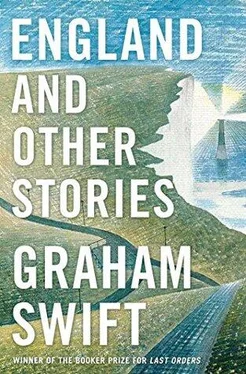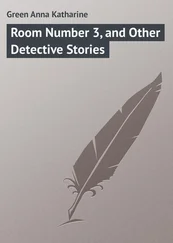Then my mother said, and my father backed her up, that I should never speak to Mr Wilkinson through the fence, or anywhere else, if I was by myself, even if he spoke to me. This had probably been the first conversation — or one-to-one encounter — I’d had with him anyway.
He stood around in his back garden in his underpants and he was a vegetarian. This settled the question of his being a weirdo. Every Sunday, without fail, the whole street smelt of roasting meat.
If the underpants and the vegetarianism didn’t clinch it, there was the matter of the visitors. Mr Wilkinson didn’t go out at regular times as people did who had jobs, but he had visitors. They came just now and then, not in a steady flow, and didn’t stay for very long. They were all sorts, but it’s true that among them were a number of what my mother called ‘young girls’.
There was nothing intrinsically improper about this and, again, you had to keep watch on Mr Wilkinson’s bungalow even to notice it. The simple explanation — that went with his teacherly demeanour — was that Mr Wilkinson gave some kind of lessons. He taught music perhaps. Given the chanting, perhaps he taught singing. But no one arrived, it’s true, with a musical instrument and we never heard, though we heard the chanting, the muffled sounds from within the bungalow of a piano or a poorly sung scale.
He taught something anyway, for which people were prepared to come for an hour or so and pay him. I actually had the misplaced fantasy that I might go round to Mr Wilkinson’s myself and be taught whatever it was he taught. Since the key to life was education. But I was glad I kept this thought from my parents.
The teaching theory never held much water, even if it was plausible and I wanted to subscribe to it. My mother — in overheard conversations with my father — kept coming back to the young girls, as if that in itself disproved it. But I could easily imagine Mr Wilkinson teaching young girls something. Elocution, deportment. I’d discovered that even very small girls at my primary school could be subjected by their parents to bouts of extra-curricular improvement. And if Mr Wilkinson had some dubious interest in young girls that was simply to do with their being young girls (and which I knew nothing of), why didn’t he restrict his visitors to young girls only? But I never voiced this argument either.
The teaching theory was scotched anyway by what, it became known, Mr Wilkinson had himself disclosed about his occupation and livelihood. Some other neighbour, bolder or more prying than my parents, had pinned him down on the matter and been obligingly told that he practised his own form of ‘alternative medicine’. It was something he’d evolved over the years through study and application. He advertised professionally and had many satisfied patients. He had even asked the inquisitive neighbour (I think it was Mrs Fox at number seven) if there was anything he might do for her.
My mother said, ‘Alternative medicine?’ Then said, ‘What’s that when it’s at home?’—a favourite phrase of hers which I much later thought was particularly apt in this case. Then she added, ‘In his underpants?’
These were remarks put to my father that, again, weren’t for my ears, though I overheard them. My father said (and, thinking about it much later too, I thought it pretty near the mark), ‘Alternative medicine? If you ask me, I think he might once have practised ordinary medicine. But now — if you see what I mean — he has no alternative.’
I retained those words because, though I didn’t understand them, I could tell my father thought he’d said something clever. The cleverness had even taken him by surprise. And though I didn’t know what the cleverness consisted of, I felt pleased for him because for a moment at least he seemed to possess the artful and inventive way with language that was characteristic of Mr Wilkinson.
I couldn’t, myself, picture Mr Wilkinson as a doctor. My childhood experience of doctors was that they were gruff, chilly people who could do nasty things to you. I continued to see him as a teacher, an educator, and perhaps alternative medicine (if it wasn’t just something bad-tasting in a bottle) was really a form of teaching. Perhaps Mr Wilkinson had some special wisdom to impart. He wasn’t a weirdo at all. The visitors who turned up now and then to ring his doorbell were his followers.
One day I had another ‘conversation’ with Mr Wilkinson which proved to be rather more than a conversation. I did the thing I wasn’t supposed to do, and I exceeded even that. It was in the school holidays. My father was at work, my mother was going to see her mother for the afternoon. I was to be dispatched, while she was gone, to play with my friend Roger West at number ten, and thus be under the watchful eye of Mrs West. But some minor crisis in the West household prevented this, and my mother, for whatever reason, couldn’t suddenly disappoint my grandmother.
For perhaps the first time in my life I was told that I’d have to be alone in the house for a whole afternoon, though it wouldn’t be so long really and I was old enough for it. But I was, strictly, to stay in the house or in the back garden and not to answer the door to anyone.
It was a warm summer’s day, so I was happy to keep to the back garden, doing more reconstruction of ‘my’ section of the flower bed. I don’t think Mr Wilkinson can have been aware of my exact situation, because of the question he asked me. But there he was again suddenly, peering through the clematis, and there was no one to witness that I was breaking my solemn oath not to speak to him.
He said, ‘Excuse me, Jimmy. Does your mother — does Mrs Simmonds — have anything for clearing drains? I’m awfully sorry to trouble her, but I’ve a spot of bother with my one at the back here. Nothing drastic, but in this hot weather, you know. .’
I could see that Mr Wilkinson was sporting a shirt collar. He wasn’t just in his underpants.
I had the child’s instinct not to say that my mother was out, the child’s alertness to the possibility of adventure — at least to the possibility of getting to know Mr Wilkinson better. Not to mention the child’s excitement at the forbidden. I didn’t know about clearing drains, but I knew there was a cupboard in the kitchen where the sort of thing that might clear them would be.
I said to Mr Wilkinson, ‘I’ll go and ask her.’
Did I say truthful and conscientious?
In the cupboard there were various jars and bottles, but there was a big tall tin labelled ‘Ajax’. I vaguely knew it had a variety of uses (my father sometimes used it for something in the garden) and that it was my mother’s answer to anything unpleasant. There was another tin of the stuff in the lavatory upstairs. Drains? Why not?
I picked it up and decided that, instead of trying to pass it over the fence — impossible for a small boy anyway — I should take it round to Mr Wilkinson directly. It was only a matter of opening the side door, which fastened with just a latch, then walking up his front path. The truth was that I was impelled by a sly curiosity: I would be just like one of those mysterious visitors, of whom there might already have been one or two that morning.
Mr Wilkinson opened his door. He looked at me and smiled. He was wearing clothes. His strong arms projected from rolled-up sleeves. ‘Oh that’s good of you, Jimmy. And so kind of your mother.’ He studied the Ajax tin, perhaps frowning a little even as he continued to smile. He could hardly reject my offering. ‘Well, perhaps it might do the trick.’
He looked at me again, the frown deepening, and seemed to hesitate. I can see now that he was coming to a significant decision: whether to take the tin, say he’d return it later, and send me away, or whether, since I was there and it was our tin, to make me a party to his drain-clearing operation. Perhaps he thought I was just a small boy and there was no danger — that is, to him. Or perhaps he was just infected with the same impetuous rush towards the hazardous that had overcome me.
Читать дальше












